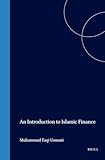An Introduction to Islamic Finance.
By: Usmani,Muhammad Taq .
.
Material type:  BookPublisher: Karachi : Maktaba Ma'ariful Quran, 2002Description: 246p.ISBN: 9789041116192.Subject(s): Finance
BookPublisher: Karachi : Maktaba Ma'ariful Quran, 2002Description: 246p.ISBN: 9789041116192.Subject(s): Finance| Item type | Current location | Call number | Status | Date due | Barcode |
|---|---|---|---|---|---|
 Books
Books
|
Ziauddin Faculty of Engineering, Sciences, Technology & Management Library - N On Display | HG187.4 USM 2002 (Browse shelf) | Available | 22700 |
Although the principles of Shari'ah require banks and financial institutions to be structured on an interest-free basis, this does not mean that such institutions are charitable concerns. As long as a person advancing money expects to share in the profits earned (or losses incurred) by the other party, a stipulated proportion of profit is legitimate. The philosophy is enshrined in the traditional Islamic concepts of musharakah and mudarabah, along with their specialized modern variants murabahah, ijarah, salam, and istisna'. This invaluable guide to Islamic finance clearly delineates the all-important distinctions between Islamic practices and conventional procedures based on interest. Justice Usmani of Pakistan, who chairs several Shari'ah supervisory boards for Islamic banks, clearly explains the various modes of financing used by Islamic banks and non-banking financial institutions, emphasizing the necessary requirements for their acceptability from the Shari'ah standpoint and the correct method for their application. He deals masterfully with practical problems as they arise in the course of his presentation, and offers possible solutions in each instance



There are no comments for this item.